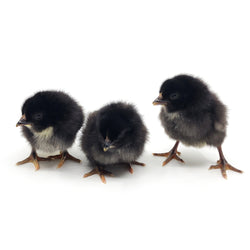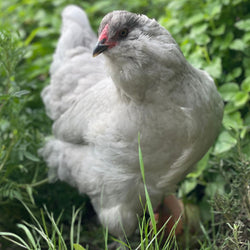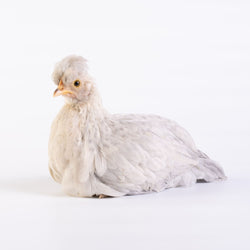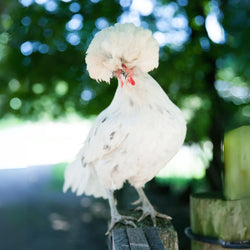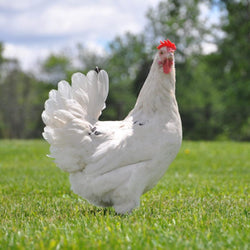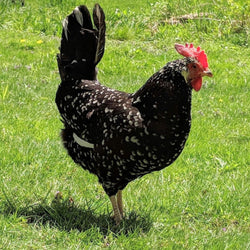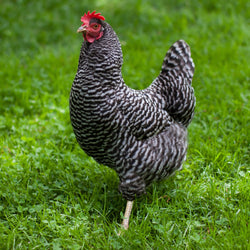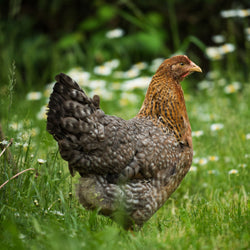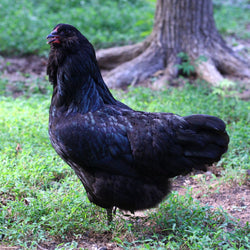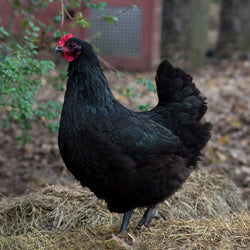page=2/--
Frequently Asked Questions
Here we answer the most commonly-asked questions about ordering, chicken care, and more.
Are there special preparations I should make if I want to have a broody hen adopt and raise my shipped chicks?
There is little more beautiful than a mother hen sheltering chicks beneath her wings. And there is little more efficient! If you have the luxury of having a broody hen to raise your chicks, you should totally take it. But there are some important things to be aware of! When you are having a broody hen raise new baby chicks that have been shipped to you, first remember that your hen has to be currently broody. If she is not broody when you try to introduce chicks to her, she may try to kill them, but she certainly won't adopt...
Read MoreI want to get a chick for Easter for my son's basket, and then find a farmer to adopt it when it has grown. How do I do that?
No, no, no... you don't want to do that. It's is a bad idea for many reasons. First, one chicken raised alone will often die of loneliness--they are flock animals and need companions. Second, baby chicks require a nice warm brooder--and by warm, we mean about 95 degrees! They will get ill and die at room temperature in an Easter basket. And third, even were you to buy several chicks and give them proper care in a brooder, generally speaking, it's still just not an ethical thing to do. It's cruel to raise a baby animal, or several, only to...
Read MoreHow can I get my brooder to 95 degrees?
First remember that it only needs to be 95° directly under the heat lamp, and only in their first week of life. (You'll be reducing the temperature of the warmest area of your brooder by about 5° every week until they're acclimated to room temperature.) They will go to the "warm" area of your brooder to hang out and get cozy when they're cold. But it's also important to have areas that they can get away from the heat lamp if they're hot! So the best way to adjust your brooder temperature is to get it to 95° under your...
Read MoreWhy is my chick's beak getting crooked, and what should I do?
Usually, chickens with crossed beaks or scissor beaks lead long, normal lives. In most cases, this defect is caused by the chick positioning herself incorrectly for hatching. Normally, one wing will shelter the head inside the shell. But if a chick doesn't have her wing positioned over her head, the skull can malform, and it will reveal itself within the first few weeks as a cross beak or scissor beak as she begins to grow. What causes this problem isn't fully understood. Think of it as sort of the chicken equivalent of a breech birth: the chick has just not...
Read MoreHow do I help a chick that isn't eating or drinking?
Well, first remember that if you hatched these babies at home, chicks don't actually need to eat or drink for the first two or three days... so the fact that your home-hatched chicks aren't eating or drinking immediately isn't always a cause for concern. Strange but true. Hatching is hard work, and with the yolk that they have just absorbed to sustain them, sometimes they just take time to rest and recover. That said, if you've had chicks shipped rather than hatching them at home---or if your home-hatched chicks are a couple days old or seem weak---they will definitely need...
Read MoreHow can I keep my brooder warm during a power outage so my baby chicks don't die?
Power loss can happen at any time due to storms, fallen trees, traffic accidents, construction, lightning, and more. A prolonged power outage can be a real problem if you have baby chicks or waterfowl in the brooder and are depending on an electric heater to keep them warm. You don't want anything to happen to your babies, so it's important to be prepared in case the power goes out on you. Here are some ideas to help keep your chicks safe in the event of a power outage: Hot Water Bottles - One of our customers from Vermont told us...
Read MoreAll about Coccidiosis disease
Coccidiosis is very common in chicks, especially ones that may be stressed from shipping or from being introduced to a new location. You can help by keeping your chicks as stress-free as possible, and by keeping their brooder dry. Some people choose to use medicated feed to combat susceptibility to this disease while the chicks develop a resistance, while others use regular feed and have no trouble with cocci. We discuss medicated feed and more, below: Coccidiosis Also called Cocci Prevalence Very common Signs General signs - Loss of appetite, weight loss or stunted growth, ruffled feathers, lethargy, and (for...
Read MoreIs it ever okay to help a chick out of the shell?
Generally speaking you will NOT want to intervene in the hatching process when incubating fertile eggs. If conditions in the incubator are right, it can take 24 hours for a chick to escape the egg after it has pipped, and that's perfectly natural and not a cause for concern. Often it takes much less time, but 24 hours or so is fairly common, too. If it's been more than 24 hours since the chick first pipped and you have had problems maintaining a high enough humidity during incubation, the problem may be simply that the chick is stuck to the...
Read More







"The Clubhouse" Coop
Easy to assemble and built to last, the Clubhouse Coop is the perfect starter coop for a small flock.
